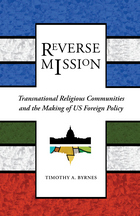
Presenting case studies from sixteen countries on five continents, The Catholic Church and the Nation-State paints a rich portrait of a complex and paradoxical institution whose political role has varied historically and geographically. In this integrated and synthetic collection of essays, outstanding scholars from the United States and abroad examine religious, diplomatic, and political actions—both admirable and regrettable—that shape our world. Kenneth R. Himes sets the context of the book by brilliantly describing the political influence of the church in the post-Vatican II era. There are many recent instances, the contributors assert, where the Church has acted as both a moral authority and a self-interested institution: in the United States it maintained unpopular moral positions on issues such as contraception and sexuality, yet at the same time it sought to cover up its own abuses; it was complicit in genocide in Rwanda but played an important role in ending the horrific civil war in Angola; and it has alternately embraced and suppressed nationalism by acting as the voice of resistance against communism in Poland, whereas in Chile it once supported opposition to Pinochet but now aligns with rightist parties.
With an in-depth exploration of the five primary challenges facing the Church—theology and politics, secularization, the transition from serving as a nationalist voice of opposition, questions of justice, and accommodation to sometimes hostile civil authorities—this book will be of interest to scholars and students in religion and politics as well as Catholic Church clergy and laity. By demonstrating how national churches vary considerably in the emphasis of their teachings and in the scope and nature of their political involvement, the analyses presented in this volume engender a deeper understanding of the role of the Roman Catholic Church in the world.

Many Catholic priests, nuns, and brothers in the United States take a strong interest in US policies that affect their "brothers and sisters" abroad. In fact, when the policies of their native government pose significant dangers to their people internationally, these US citizens engage actively in a variety of political processes in order to protect and advance the interests of the transnational religious communities to which they belong. In this provocative examination of the place of religion in world politics, Timothy A. Byrnes focuses on three Catholic communities—Jesuit, Maryknoll, and Benedictine—and how they seek to shape US policy in El Salvador, Nicaragua, and Mexico. Based on years of fieldwork and on-the-ground interviews, Reverse Mission details the transnational bonds that drive the political activities of these Catholic orders.
This fascinating book reveals how the men and women of these orders became politically active in complex and sometimes controversial causes and how, ultimately, they exert a unique influence on foreign policy that is derived from their communal loyalties rather than any ethnic or national origin.
READERS
Browse our collection.
PUBLISHERS
See BiblioVault's publisher services.
STUDENT SERVICES
Files for college accessibility offices.
UChicago Accessibility Resources
home | accessibility | search | about | contact us
BiblioVault ® 2001 - 2024
The University of Chicago Press









